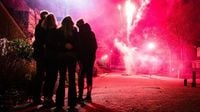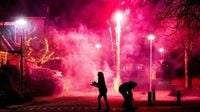In a significant shift in policy, the Dutch Parliament appears poised to implement a comprehensive ban on fireworks, a decision that has sparked both support and opposition across the political spectrum. As of April 1, 2025, a majority in the Tweede Kamer (Dutch Parliament) has expressed its backing for a complete prohibition on consumer fireworks, a move that has been in the making for years.
Support for the ban has gained momentum particularly following a series of incidents during the last New Year's Eve, where over 8,000 fireworks-related incidents were reported, many involving violence against police and emergency workers. This alarming statistic has prompted calls from various sectors, including hospitals and police unions, for a total ban on consumer fireworks.
Notably, the NSC party, which had previously opposed a ban, has now shifted its stance, emphasizing that the safety of police and emergency personnel is paramount. NSC member Faith Bruyning stated, "The deciding factor was that the tradition can no longer be kept safe. We would prefer to see a fireworks ban this year." With this endorsement, 94 members of Parliament now support the initiative, which also enjoys backing from the GroenLinks-PvdA and Partij voor de Dieren.
While the VVD (People's Party for Freedom and Democracy) has also come on board, they have set conditions for their support, including a demand for an effective enforcement plan and compensation for businesses that sell fireworks. The VVD's change of heart followed extensive discussions with police and emergency services, who have long advocated for stricter regulations. VVD-Kamerlid Michon remarked, "All conversations we had with police and fire personnel, those will not leave you cold."
Despite this growing consensus, opposition remains strong from parties such as the PVV (Party for Freedom), BBB (Farmers' Citizens Movement), and Forum for Democracy, who argue that the fireworks tradition should be preserved. They contend that the focus should instead be on addressing the behavior of those who misuse fireworks rather than imposing an outright ban.
The proposed ban would outlaw all consumer fireworks, including cake boxes, fountains, decorative pots, and compound boxes, while allowing for organized fireworks displays under controlled conditions. This aspect is crucial for the NSC, which proposes that fireworks shows could still take place under municipal supervision.
As municipalities prepare for the potential ban, they have expressed concerns regarding the costs associated with enforcement and the need for clear communication with residents about the rules. The Association of Dutch Municipalities has requested clarity on how they will be compensated for the implementation of the ban.
Moreover, the fireworks industry is bracing for significant financial losses, with calls for compensation amounting to €895 million to cover investments made in safe storage and operations. State Secretary Chris Jansen has indicated that if the ban is implemented before the next New Year's Eve, compensation for the industry could range from €100 to €150 million. However, he has cautioned that if the ban takes effect in 2026 or later, the compensation would be minimal or non-existent due to the extended transition period.
As the debate continues, various stakeholders are weighing in. Eye specialist Tjeerd de Faber from the Eye Hospital in Rotterdam expressed optimism regarding the ban, stating, "I am very happy that common sense and reason prevail." He believes that effective enforcement of the ban could eliminate the risk of eye injuries during the holiday season.
Looking ahead, the Tweede Kamer is set to debate the fireworks ban on Thursday, April 3, 2025, where further details regarding the proposal and its implementation are expected to emerge. This debate will also highlight the positions of the opposition parties, including Denk, whose stance remains uncertain.
As public opinion continues to evolve, a recent poll indicated that over half of the Dutch population supports a fireworks ban, reflecting a growing recognition of the safety and health concerns associated with fireworks.
The upcoming discussions in Parliament will be pivotal in determining not only the fate of the fireworks ban but also the future of a long-standing tradition in the Netherlands. Will the ban be enacted this year, or will it face further delays and modifications? Only time will tell.








